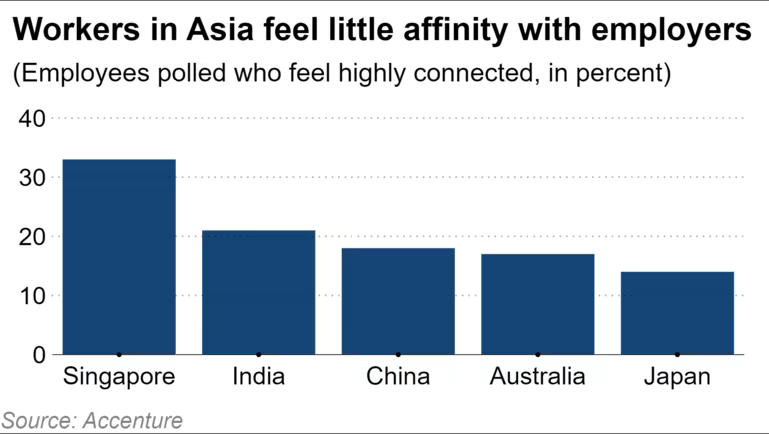From Singapore to Japan, workers get restless as offices call
Surveys signal clash between employer and employee priorities after COVID
Workers in Singapore: Asian employers are more eager to bring people back to offices than Western companies, research suggests.
© Reuters
DYLAN LOH, Nikkei staff writerSeptember 19, 2022 11:00 JST
Surveys signal clash between employer and employee priorities after COVID
SINGAPORE -- Restlessness is creeping through Asia's workforces as much of the region attempts to shake off COVID-19 precautions and restore a semblance of business as usual.
Recent research shows that Asian companies are more eager than their Western counterparts to open up offices and bring employees back full time, after more than two years of widespread remote work. But many employers are being met with reluctance or resistance, with some studies showing that large proportions of workers lack a feeling of "connectedness" to their organizations and are likely to quit.
Experts suggest that as employees rethink their priorities, employers may need to do the same.
"As flexibility has now become the new standard requirement, it is critical that employers reevaluate their employee value proposition to address the key workforce concerns of today, particularly around competitive compensation and career growth opportunities," said Samir Bedi, workforce advisory leader for the Association of Southeast Asian Nations region at professional services firm EY.
A survey EY published in July found that 45% of respondents in Southeast Asia indicated they were likely to leave their jobs in the next 12 months. This was the result mostly of a desire for higher pay, better career opportunities and more flexibility amid rising inflation, a shrinking labor market and an increase in jobs offering flexible work, EY said. The survey covered more than 1,500 business leaders and over 17,000 employees across 22 countries.
Yet many Asian companies seem intent on forcing workers back into the office. Earlier this year, when U.S. real estate services firm CBRE surveyed 150 Asia-Pacific companies, nearly 40% of respondents were expecting staff members to work fully on site, up from 26% in 2021. This contrasted sharply with results from the U.S., Europe, Middle East and Africa, where just 5% or fewer expected workers to be in the office all the time.
Michelle Leung, a human resources officer at health services company Cigna International Markets, highlighted sweeping changes in the labor market amid the pandemic.
"One of the biggest trends that we saw in 2021 was 'The Great Resignation,' which saw resignations around the world reaching an all-time high," Leung said. "However, another phenomenon has been 'The Great Reshuffle,' which refers to a large swath of workers reconfiguring their careers and focusing on jobs that best fit their personal needs."
Leung said that it is "clear that a number of factors are driving general dissatisfaction and restlessness." Companies, she continued, will need "to keep pace with new employee expectations and adopt a more holistic approach to the types of benefits they provide."

Cigna's own research has found that expatriates are not immune to the dissatisfaction and unease spreading through the Asian workforce.
Its well-being survey of nearly 12,000 people across China, Japan, Singapore, India and Australia found that expat stress had reached an all-time high, with almost all respondents feeling symptoms of burnout and reevaluating life and work priorities for more flexibility, or to be closer to family and friends.
The study, published in June, showed that the significant majority of expats working in Europe and Australia were confident that they would remain overseas. The same could not be said for Asia, with only 5% of those in India and 16% of those in mainland China confident that they would stay put.
Another set of troubling numbers for employers was released in May by the consultancy Accenture. Its survey of about 5,000 workers and 1,000 top executives in a range of countries found that in places such as Singapore, India, China and Japan, fewer than 40% of respondents felt highly connected to their colleagues and companies.
One might assume that this was the result of pandemic disruptions and months or years of remote work. But a closer look at the data shows that those who worked on-site felt the least connected, versus their remote- or hybrid-working peers.
"The commonly held assumption is that on-site location equals connectedness. It is not necessarily true," Anoop Sagoo, Accenture's chief operating officer for growth markets, told Nikkei Asia.
He went on to say that "while organizations might look at an office environment as one that boosts creativity and innovation because of face-to-face interactions," the survey indicated that many employees do not feel it meets their needs. "Part of the reason why so many workers, especially those in the office full time, are disconnected is due to feeling ignored by leadership and senior management," he added.
The study also found that among employees who are able to work remotely, over 90% said they can be productive anywhere.
Source: https://asia.nikkei.com/Spotlight/Coronavir...as-offices-call

